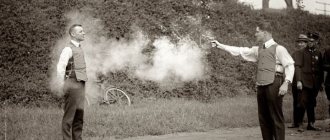Why are the first signs possible?
The reasons that can cause a leak in an apartment can be divided into professional mistakes or shortcomings, and everyday accidents. The first includes errors when installing gas equipment, including faulty pipes, cylinders, columns, as well as too loose fastening of the gas hose. Such causes of household gas leaks may not be detected immediately.
Gas shut off
Partial or loose closing of the tap, or the extinguishing of the fire on the gas burner of the stove due to a draft or other reasons, can also cause a leak. The fact that the gas is partially burned can be seen by the color of the fire. During normal operation of gas equipment, it has an even blue color. If you see that the flame has turned yellow or acquired reddish tints, then this indicates a malfunction and you should contact a specialist.
The main danger of natural gas is that it is completely neutral in odor and color. But for timely detection of its leakage, a special substance is added to the gas used in everyday life, which has a sharp and strong specific odor.
Therefore, the very first sign will be the appearance of an unpleasant sour gas smell in the house.
If the leak was not detected immediately, the person will experience gas poisoning. Its symptoms include headache, dizziness, dry mouth, general weakness, nausea, red eyes and watery eyes, pale skin, sleep and appetite disturbances. You should immediately consult a doctor who will determine the degree of gas vapor poisoning.
To summarize: gas leaks are possible both due to professional miscalculations and due to household negligence.
The first option includes:
- pipe defects;
- flaws in the cylinder;
- column malfunction;
- poor hose connection or damage;
- wear of the hose gasket and seal on the tap;
- malfunction of burners;
- Inside the plate, the thread on the nut connecting it to the hose may be torn off.
Common mistakes include situations when:
- the flame in the burner went out;
- The tap is not turned all the way.
Signs of a gas leak
In order for gas lines to be safe, it is necessary to promptly detect and eliminate leaks of blue fuel. This especially applies to intra-house wiring, although communications laid underground and located close to an industrial or residential area also pose a considerable danger if they become depressurized.
Gas leaks are caused by corrosion of gas pipes, ruptures of welding seams when the capabilities of temperature compensators are insufficient, poor-quality welding, insufficient reliability of threads, flanges and the gas equipment itself.
Regardless of whether these are pipes inside the house or laid underground, leaking gas fuel first manifests itself with a specific “aroma.”
In order to avoid negative consequences, you need to know exactly how to check for gas leaks. The first and main sign is the presence of a sour, pungent odor. The reason household gas gives such an odor is that it should be easily detectable by apartment residents.
It is important to pay attention to the condition of indoor plants; they may acquire a yellowish tint. It is possible to detect gas leaks by ear. If you listen carefully, you may hear whistling or hissing sounds.
If you listen carefully, you may hear whistling or hissing sounds.
If you listen carefully, you may hear whistling or hissing sounds.
In addition, cloudy wave-like movements are observed at the leak site. When applying a soap solution to the suspected leak site, bubbles appear in the water.
When staying in a room with a gas leak for a long time, a person’s health worsens:
- migraines and dry mouth appear;
- the person feels nauseous and dizzy;
- pallor of the skin is obvious;
- the mucous membrane of the eyes turns red;
- there is difficulty breathing.
All of the above factors indicate carbon monoxide poisoning. The victim should immediately consult a doctor.
Natural methane generally does not have the characteristic smell of gas that we smell, but for everyday use, a special substance is added to it, which gives the gas an aroma.
Due to the fact that the room stinks, the consumer can immediately determine that an explosive substance has leaked. Therefore, the main sign of the unwanted spread of methane or propane-butane is the appearance of a sharp unpleasant odor.
Leaks can also be detected by ear. All equipment that operates and supplies gas flows, including stoves and ovens, operate under pressure, so when household gas vents, a characteristic whistle or hissing will be heard.
Unknown air rising from the ground is another telltale sign that is often the cause of plant death. Green spaces that die for no apparent reason may disappear precisely as a result of gas escaping from the pipeline.
What to do
The first thing you should do is stop the leak, following all the steps, try not to breathe the gas-air mixture indoors, use a wet hoe. Completely close the outlet valve on the gas pipe, turn off the burner, thereby stopping the flow of gas to the stove. You need to notify your neighbors and call a special emergency service.
To avoid an explosion, the best option would be if you completely de-energize the apartment, since when you turn on the light, a spark may form inside the switch due to poor-quality wire connections, and at a certain gas concentration in the apartment this will cause irreversible consequences.
What to do if you smell gas in the entrance
Open windows and vents wide to ventilate the entire room. While waiting for specialists to arrive, do not try to use electrical appliances under any circumstances; it is prohibited to use matches, a lighter or smoke. Better to go outside. It will be possible to enter the premises only after the smell of gas has disappeared and the emergency services have given permission.
If you smell gas on the landing, do not ignore this fact. Notify the gas service of your suspicions. Don't use doorbells. Organize a walk-through of apartments to identify the source of the spread, knock on the door. If you do not receive an answer, leave the room.
Measures to help avoid gas problems
There are unforeseen situations that are almost impossible to influence. But it is within our power to be more attentive to gas equipment
(at least let in the gas service employees who came to check the equipment).
You cannot use a gas stove to heat your apartment.
It is always important to control the cooking process
. Don't leave the kitchen for too long while you're preparing food. Even if a leak occurs, you will be able to react to it in time.
Some housewives can set the broth to boil and go to the market at this time to buy food. Despite the fact that there is no one at home. The author of the article is familiar with such people and does not share their position, considering this to be extremely irresponsible behavior. Unfortunately, we never know if there are such housewives among our neighbors.
To increase the level of security in the apartment, you can install special detectors that emit a sound signal when there is a gas leak. Such sensors can be part of a comprehensive smart home solution.
How to use gas cylinders correctly
Violating the rules for storing or using gas containers can often lead to an explosion, so you need to know the following:
On this topic ▼
Household gas appliances
Rules of operation and use
- The cylinder should only be stored in a well-ventilated area. Do not lay it down, it must be in an upright position. A basement with high humidity is not suitable for storing it. Also, the balloon should not be instilled. In addition, the place where it is stored should not be exposed to sunlight.
- Do not begin replacing equipment if there is an open fire or running electrical appliances nearby. The taps must be completely closed. After replacing the old cylinder, do not be lazy and check the tightness of the connections. To do this, prepare a regular soap solution and apply it to the pipe; if bubbles appear, then the joint should be tightened.
- Any gas equipment should only be checked and repaired by a specialist.
- Gas containers that you are not currently using should be stored in a separate room.
- Clean burners regularly. Do not allow them to become clogged.
Household gas and causes of explosion
Signs of a gas leak
In order to avoid negative consequences, you need to know exactly how to check for gas leaks. The first and main sign is the presence of a sour, pungent odor. The reason household gas gives such an odor is that it should be easily detectable by apartment residents.
It is important to pay attention to the condition of indoor plants; they may acquire a yellowish tint. It is possible to detect gas leaks by ear. If you listen carefully, you may hear whistling or hissing sounds.
If you listen carefully, you may hear whistling or hissing sounds.
In addition, cloudy wave-like movements are observed at the leak site. When applying a soap solution to the suspected leak site, bubbles appear in the water.
When staying in a room with a gas leak for a long time, a person’s health worsens:
- migraines and dry mouth appear;
- the person feels nauseous and dizzy;
- pallor of the skin is obvious;
- the mucous membrane of the eyes turns red;
- there is difficulty breathing.
All of the above factors indicate carbon monoxide poisoning. The victim should immediately consult a doctor.
Preventive measures
Nowadays, there are many different ways to secure your home. There is also special equipment that helps to detect leaks from gas equipment in a timely manner and warn people about it. It's called household gas leak detectors. They differ in both price and effect.
The simplest and most affordable option is the electronic version. It simply plugs into the outlet. When a gas leak occurs, it lets you know with a sound and/or light signal. The main disadvantage is its uselessness in the event of a power outage.
Gas leak sensor
The rechargeable type requires a battery, with which the sensor can operate without power for up to 2 days. The most effective and more expensive option is sensor systems. They include not only a device that responds to gas vapors in the air, but also a fire alarm.
However, household gas leak sensors are only able to warn in time about a situation that has arisen, and not to warn, and certainly not to eliminate it.
It is better to follow preventive measures that will help avoid leakage and its consequences.
- If you have heating stoves or fireplaces, check the intensity and quality of the draft, especially when gas appliances are operating.
- The room must have good ventilation. Open the windows from time to time.
- When cooking, do not move far from the stove.
- Do not allow young children to use a gas stove in the absence of adults.
- When leaving the apartment, close the gas supply tap, and it is also recommended to unplug household electrical appliances.
- Make sure that the equipment is in good working order and periodically check it with soapy water.
- Do not store cylinders for repairs in the apartment or on the premises of the house.
There are also categorical prohibitions that you should be aware of. Without permission, do not begin redevelopment or major repairs in a house where there are gas communications and tanks. Without special skills and knowledge, you should not attempt to repair, replace or install such equipment yourself. Any wrong action can lead to disastrous consequences.
Channels and hatches necessary for ventilation should not be closed or sealed, or their structure should be changed. Do not make any changes to the design of gas exhaust devices. If there are automatic control devices, do not turn them off.
Gas appliances in apartments have become so common that people have stopped seeing them as a danger. Such a careless attitude can lead to a leak that, at best, will cause mild poisoning, and at worst, an explosion and death of many people.
Preventing domestic gas leaks
This information should definitely be remembered; everyone should know it.
- The rules for using gas appliances should be strictly followed.
- Gas appliances must always be clean and in good working order.
- For systematic ventilation of the room, you can use ordinary window vents, periodically opening them for ventilation.
- You should check whether there is good draft in the chimneys of heating stoves before lighting them and during operation of these devices.
- The operation of the supply and exhaust ventilation should be checked.
- It is necessary to demand from the heads of housing and maintenance offices (housing maintenance offices) that specialists check ventilation and chimneys at least once a quarter.
- If there is no draft, it is prohibited to use heating and hot water boilers, geysers and stoves.
- Large dishes with a wide bottom should not be placed directly on the burners of gas stoves, but on special burners with high ribs.
- Do not allow children to use any gas appliances on their own.
- Use gas sparingly.
- Do not leave gas appliances turned on unattended, even for a very short time.
- Always turn off the gas, electricity, water, and unplug household appliances before leaving the house.
It is strictly prohibited:
- Independently carry out gasification of an apartment, house, garden house, as well as repair, replace and rearrange gas equipment.
- Carry out redevelopment of premises where various gas appliances were installed.
- It is also prohibited to make any changes to the design of gas appliances; it is also prohibited to change the design of smoke and ventilation systems (ducts). It is prohibited to seal ventilation ducts, wall up the “pocket” and hatches that are necessary for cleaning chimneys.
- Turn off automatic safety and regulation devices.
- It is prohibited to use gas with faulty gas appliances, as well as faulty automation devices, fittings and gas cylinders.
Always be extremely careful when using gas in an apartment or house, because this is the key to your safety and the safety and health of your family, loved ones, and neighbors!
Let's sum it up
If you smell gas indoors or outdoors, or if an emergency occurs on gas equipment or gas pipelines:
- call the emergency gas service: 04, 104.
- stop using gas appliances;
- close the valves on the lower side in front of the devices and on the device itself;
- extinguish other sources of fire;
- open the window (window);
- do not allow open flames to appear, or electrical equipment to be turned on and off;
- leave the gas-filled room;
- organize a meeting of the emergency team.
Who to call if you smell gas?
If you detect a persistent smell of gas in your apartment, there is no need to panic. It is important to immediately stop its supply by turning the valve on the gas pipe. Every family member should know where the valve is and where to call in case of a leak in order to reduce the risk of threat to life and health.
After shutting off the supply of the explosive mixture, all windows and doors should be opened wide to remove dangerous fumes, ensuring maximum flow of fresh air into the apartment. It would be a good idea to check that people passing by do not smoke.
Immediately after this, at any time of the day, you need to call the emergency service and call specialists to get rid of the cause of the methane leak. The contaminated room should be left until the emergency team arrives.
Important! If the gas valve is closed, but the leak continues, it is strictly forbidden to return to the premises until specialists arrive.
Who to call if you smell gas?
You can call the emergency gas service:
- by calling the hotline.
- by calling the emergency dispatcher:
- from landline phones - 104
- from mobile phones - 112
or depending on the telecom operator, the combination of numbers will be as follows:
- MTS and Megafon – 040;
- Beeline – 004;
- Sky Link – 904.
Calls to emergency gas service numbers are free.










